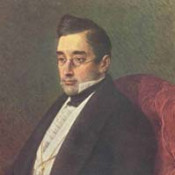
Anniversary of Alexander Griboyedov, Russian author and diplomat
“It should have been his friends to write his biography;
but here remarkable people disappear without traces.
We are lazy and uncurious…”
A. S. Pushkin, “Travel to Erzurum” (1835)
4 (15) January 1795 was born Russian writer and diplomat Alexander Griboyedov. He descended from an ancient noble family, whose forefather, John Grzhibovskiy, came from Poland at the beginning of the XVII century.
Griboyedov spent his childhood and youth in his mother’s house in Moscow. Dreaming of a brilliant career for her son, she gave him an excellent education, first under the guidance of foreign tutors and then at the Moscow University noble boarding school. In 1806 Griboyedov entered Moscow University, where he first completed the course at Language and Literature Department, and then - at Ethics and Politics Department.
Griboyedov was one of the most educated men of his time and, according to Pushkin, one of the smartest people in Russia". Having excellent command of the major European languages (French, English, German, Italian, Greek, Latin), and having mastered later oriental ones too (Arabic, Persian and Turkish), he also possessed musical talent - was an excellent pianist, a composer (had written two waltz for piano).
At the beginning of the Patriotic War of 1812 Griboyedov quit his scientific work and joined the Moscow Hussar regiment as a cornet in reserve units. In late 1815 he retired and settled in St. Petersburg, leading a high life. Inspired by literature and theater, Griboyedov met a famous poet and theatergoer P. A. Katenin, with whom he created the comedy "Student" in 1817, and became friendly with a circle of playwright and theatrical figure A. A. Shakhovskoy.
In 1817 Griboyedov joined the State Board for Foreign Affairs, but because of the "fiery passions and powerful circumstances”, by definition of Pushkin, in 1818 he was forced to leave the capital and went to Persia as a secretary of the Russian diplomatic mission.
After three years of service in Tabriz, in February 1822 he transferred to Tbilisi to serve Georgia Superintendent General A. P. Ermolov. Here were written the 1st and 2nd acts of the most famous of his works - the comedy "Woe from Wit", which the first listener was a colleague of the author in Tbilisi, Decembrist V. K. Kuchelbecker. By the autumn of 1824 the comedy was finished, but censorship approved only excerpts of it, published in 1825 by writer F. V. Bulgarin in the anthology "Russkaya Talia” (Russian Waist).
This work quickly became an event of Russian culture, spreading among the reading public in handwritten copies, which number was close to the book circulations at the time. Already in January 1825 one of these copies was brought to Pushkin in Mikhailovskoye village by Decembrist I. I. Pushchin. As predicted by Pushkin, many lines of "Woe from Wit" became proverbs and sayings ("Legend is recent, but I can hardly believe it" "Happiness takes no account of time").
In February 1826 Griboyedov was summoned to St. Petersburg as a suspect in the case of the Decembrists, since papers of many detainees contained copies of "Woe from Wit". Besides, during interrogations, some of them had named Griboyedov as a member of the secret society. However Griboyedov managed to destroy part of his archive, and at the investigation he strongly denied any involvement in the conspiracy. Thus, in early June he was released from custody.
Having returned to the Caucasus shortly after the Russian-Persian War of 1826-1828, Griboyedov was employed as a diplomat and, having achieved considerable success in this field, prepared the Treaty of Turkmenchay, which was advantageous for Russia. In March 1828 the Russian diplomat brought to St. Petersburg the documents of the peace treaty, for which he was awarded the Order of St. Anne, the rank of Councillor of State and the appointment of Minister Plenipotentiary to Persia.
After returning to Persia, Griboyedov started to implement into practice one of the articles of the peace treaty, involving the repatriation of citizens of Russia. When two Armenian women, taken to a noble Persian harem, appealed to him for help, the tension around the Russian mission flared up, and this was the reason for the reprisal of an active diplomat.
January 30 (February 11), 1829 the crowd, instigated by Muslim fanatics, smashed up the mission in Tehran. Russian envoy was killed.
Griboyedov was buried in Tbilisi on St. David Mount. On the tombstone are inscribed the words of his wife Nina: "Your mind and deeds remain immortal in the memory of Russians, but why has my love outlasted you?"
Lit.: Грибоедов А. С. Полное собрание сочинений. Т. 1-3. СПб., 1911-1917; А. С. Грибоедов в воспоминаниях современников. М., 1980; Пиксанов Н. К. Летопись жизни и творчества А. С. Грибоедова, 1791-1829. М., 2000; Фомичёв С. А. Комедия А. С. Грибоедова «Горе от ума»: Комментарий. М., 1983.
Based on the Presidential Library’s materials:

